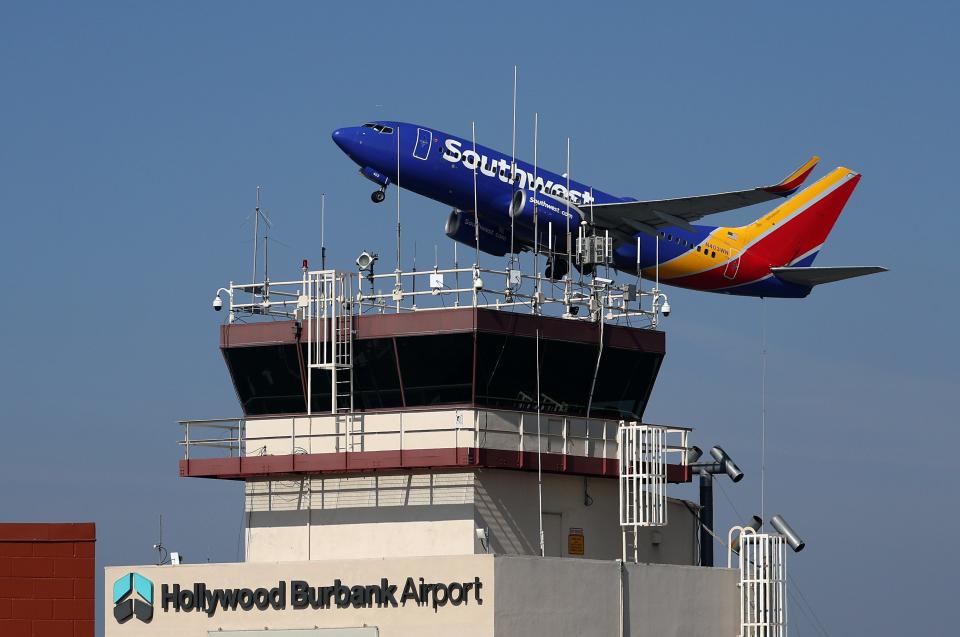Congress extends funding for the Federal Aviation Administration. Here's what to know.
Congress passed a new long-term funding bill for the Federal Aviation Administration Wednesday afternoon, ensuring the agency's continued operation for the next five years. President Biden is expected to sign the legislation into law imminently.
The previous five-year funding bill expired on Sept. 30, and Congress has been supporting the agency with short-term measures in the interim. The latest stopgap funding was set to expire on Friday.
The new FAA authorization brings multiple safety improvements with it, including a requirement for 25-hour cockpit voice recorders. Previous regulations required only two hours of recording capacity, the limits of which were highlighted by January’s Alaska Airlines explosive decompression incident. The voice recordings from the incident had already been overwritten by the time investigators retrieved the devices.
“The American people expect and deserve the safest, most reliable and modern aerospace system in the world and this landmark bill is intended to deliver just that,'' Senate Commerce, Science and Transportation Committee chair Maria Cantwell said in a statement after her chamber passed the legislation Thursday. "Our bipartisan legislation sets clear priorities to strengthen aviation safety standards, implement new safety technology, hire more air traffic controllers and safety inspectors, give passengers a guaranteed right to a refund, advance innovation and modernize our air travel infrastructure nationwide."
The legislation also establishes refund standards for non-refundable tickets and bars airlines from charging additional fees to families that want to sit together onboard.

Here are some key issues the draft legislation is looking to address:
Ensuring passenger refunds: The Department of Transportation’s recently announced rules require airlines to issue automatic cash refunds for flight cancellations and significant delays. The proposed law seeks to codify these requirements, establishing thresholds for refunds and mandating reimbursement policies for passengers affected by cancellations or delays.
Air traffic controller shortages: The legislation aims to tackle the persistent shortage of air traffic controllers, which has led to mandatory overtime and fatigue-related incidents. The proposed law mandates the FAA to study the issue and enhance training facilities to address staffing shortages.
Extending cockpit recordings: Investigative bodies like the National Transportation Safety Board (NTSB) have long advocated for extending cockpit voice recording times to 25 hours to aid crash investigations. However, the legislation only requires the FAA to consider this recommendation, citing cost concerns as a potential hurdle.
Flight simulator training: Pilots will not be allowed to substitute more time in flight simulators for time at the controls of an actual aircraft when qualifying for licenses.
Enhancing protections for airline workers: The legislation strengthens rules against attacks on aviation workers and expands legal protections to ground-based employees like gate and check-in agents. It also enhances self-defense training for flight attendants to better respond to unruly passengers.
Notably missing from the draft is a mandate on minimum airline seat size. Instead, the bill directs the FAA to revisit seating and evacuation standards. It also doesn’t require raising pilots’ retirement age, a provision some legislators and advocates had proposed. Instead, it calls for a study on the impact of the pilot shortage on regional and commuter carriers, a decision applauded by pilot unions.
“This FAA Reauthorization is a true bipartisan win for our entire economy as well as a landmark improvement for aviation safety that will benefit the flying public and consumers across this country,” Sen. Tammy Duckworth, D-Ill., said in a statement. "Not only does this package include so many of my priorities—including my EVAC Act to ensure emergency evacuation testing reflects realistic situations, a provision upholding strong pilot certification standards and another increasing aviation workforce development funding by six-fold each year—it also represents the most significant effort by Congress in over a decade to make flying safer, easier and more accessible for passengers with disabilities.”
Zach Wichter is a travel reporter for USA TODAY based in New York. You can reach him at zwichter@usatoday.com
This article originally appeared on USA TODAY: Congress passes new FAA legislation, updates rules for aviation

